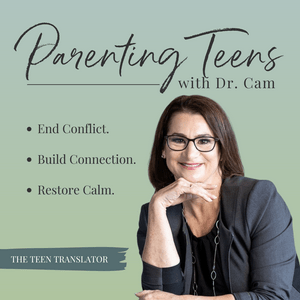If you’ve asked your teen to do a chore and they responded like you just requested a kidney… welcome. 🫠
Because here’s the thing: the chore battle usually isn’t about the chore. It’s about what happens after you ask—the stalling, the eye rolls, the “in a minute,” the sudden deep commitment to scrolling, and you repeating yourself until your voice hits a pitch only dogs can hear.
In this episode of Parenting Teens with Dr. Cam, Dr. Cam breaks down the real reason chores blow up in so many homes—and why most of the common fixes (punishment, consequences, rewards, bribing, threatening, lecturing) often backfire long-term.
You’ll learn the simple shift that can turn chores from a power struggle into cooperation—without begging, nagging, or doing it all yourself—plus the one mistake that accidentally teaches teens to avoid chores (and you) even more.
If chores have become the hill your household dies on… this episode will change how you look at it—and what you do next.
This is Part 2 of the series: 7 Behaviors Parents Often Punish That Are Actually Signs of Healthy Development.
WHAT YOU’LL LEARN IN THIS EPISODE
Why “clean your room” can feel impossible to a teen brain (even when they want to do it)
The hidden reason punishment makes chore resistance worse over time
The mindset shift that gets teens to help without the constant reminders
How to build responsibility in a way that doesn’t destroy your relationship
🎧❤️ ENJOYING THE SHOW?
Don’t keep it to yourself! Share your favorite episode and leave a rating and review to help other parents find the support they need. Your feedback helps me create even more episodes filled with practical tips for you and your family! 🙏💫
🔔 Remember to hit SUBSCRIBE so you never miss another solution-packed episode! 🙌
RESOURCES MENTIONED IN THIS EPISODE
Website: https://www.askdrcam.com
The COLLABORATE Method™ Parenting Program – A step-by-step approach that helps you respond confidently to any teen struggle (chores, motivation, attitude, school stress, and more): https://www.askdrcam.com/collab
CONNECT WITH YOUR HOST: Dr. Cam Caswell
Website: AskDrCam.com
Instagram: @DrCamCaswell
YouTube: Parenting Teens with Dr. Cam
EPISODE CHAPTERS:
Why chores trigger so many power struggles
The surprising reason your teen avoids starting (even when it’s simple)
The parenting response that quietly increases resistance
The “nag-free” strategy that changes cooperation
How to build responsibility without resentment
ABOUT THE SHOW
The Parenting Teens with Dr. Cam Podcast is your go-to resource for navigating the challenges of raising teenagers. Hosted by Dr. Cam Caswell, an adolescent psychologist and certified parenting coach, this podcast offers practical parenting strategies, expert advice, and real-world insights to help you build a stronger relationship with your teen and support their emotional growth. Whether you’re struggling with teenage behavior or looking to improve communication, each episode provides actionable tips to make parenting teens easier and more rewarding. Perfect for both new and seasoned parents, this podcast helps you build the confidence to handle teen challenges and thrive together.
#theteentranslator #drcamcaswell #parentingteenswithdrcam #teenchores #parentingteens


